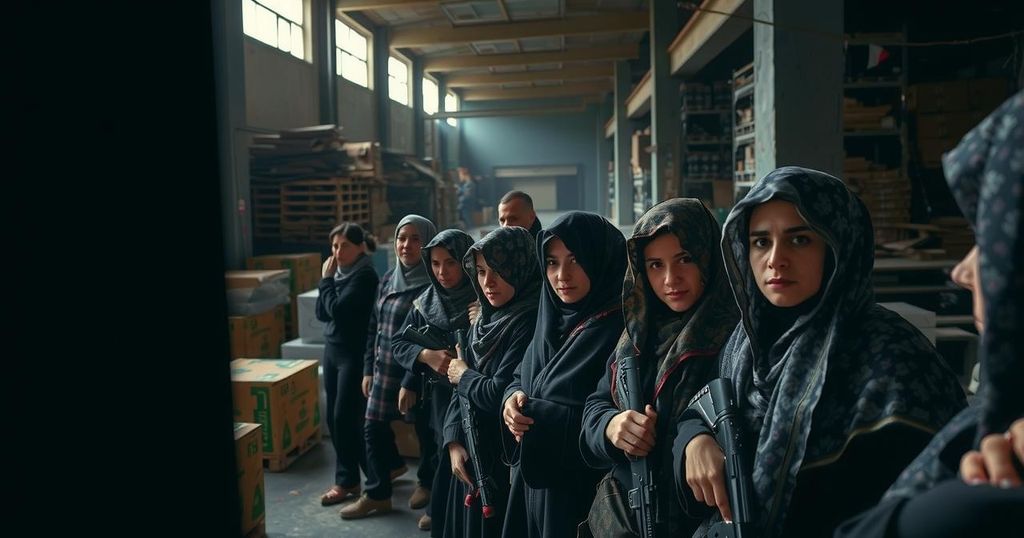Sierra Leonean Women Seek Refuge from Conflict in Beirut’s Shelter
A group of Sierra Leonean women, including Jaiatu Koroma, has found refuge in a warehouse in Beirut due to escalating violence between Israel and Hezbollah. Over one million people have been displaced by the conflict, with the IOM receiving thousands of requests for assistance. The women are affected by Lebanon’s kafala system, which has faced criticism for human rights abuses. The shelter provides basic necessities, but the plight of these women reflects broader systemic issues regarding migrant labor in Lebanon.
In Beirut’s imposing landscape, a group of Sierra Leonean women, including 21-year-old Jaiatu Koroma and her five-month-old daughter, have taken refuge in a repurposed warehouse that serves as a shelter from escalating conflict. Following a significant increase in hostilities, with Israeli forces targeting Hezbollah positions, Koroma fled her home in southern Beirut and initially found herself sleeping on the streets. Now, the warehouse, filled with basic supplies, provides them with much-needed sustenance including food, water, and essentials like diapers. The ongoing conflict has displaced over one million individuals, resulting in devastating casualties, with recent reports indicating that more than 2,546 people have died over the past year, predominantly within the last month as violence intensified after September 23. This dire situation has forced an increasing number of women like Koroma to seek shelter in this makeshift refuge, known as The Shelter, where they share mattresses, converse, and find brief solace from the surrounding turmoil. The plight of these women is compounded by their circumstances as migrant workers under Lebanon’s controversial “kafala” system, which has faced criticism for enabling exploitation and abuse. Jaward Gbondema Borniea from the Sierra Leone consulate in Beirut noted the surge of citizens stranded due to the conflict, emphasizing the consulate’s efforts in collaborating with the International Organization for Migration (IOM) to provide emergency travel documents and facilitate repatriations for vulnerable individuals. As of now, the IOM has received approximately 15,000 requests for return assistance, with 1,300 coming from Sierra Leone. Despite these efforts, the conditions in the warehouse are challenging, as Dea Hage Chahine, one of the volunteers managing the facility, reported an overwhelming increase in the number of women seeking refuge. Hage Chahine has been instrumental in organizing resources, setting up a kitchen, and ensuring that the women receive the support necessary in this time of crisis. Amidst the turmoil, many women express a longing to return home. Susan Baimda, who has been at the shelter for two weeks, articulated the emotional strain of being away from her children, expressing the urgency of returning to her family and the dire need to escape the ongoing violence. Women in the shelter continue to care for one another, fostering a sense of community and resilience amidst their hardships.
The ongoing conflict in Lebanon, particularly involving Israel and Hezbollah, has led to widespread displacement and suffering among local and migrant populations. The situation has been exacerbated since September 23, when military actions escalated dramatically. Many migrant workers, including those from Sierra Leone, have found themselves caught in this turmoil, often facing exploitative labor conditions under Lebanon’s kafala system. This system, while facilitating their employment, has led to a cycle of dependency and abuse, as workers often lose their rights and freedoms. Amidst this backdrop, shelters like The Shelter provide crucial support to women fleeing violence, offering a temporary haven and essential resources as they navigate their precarious situations.
In conclusion, the situation for Sierra Leonean women in Lebanon remains critical as they face the dual challenges of war and displacement. Shelters like The Shelter play a pivotal role in providing immediate support and community for those affected by the conflict. However, the systemic issues surrounding migrant labor, particularly within the kafala system, highlight the urgent need for reform to protect vulnerable populations. As organizations work towards repatriation and assistance, the voices of these women underscore a desperate call for safety, dignity, and the right to return to their homes.
Original Source: www.ndtv.com




Post Comment